The royal O’Donnell’s sank roots in the far north of Ireland, but not us. Our uprooted family traveled here in 1857 on a packet ship#, poor, refugees, the Potato Famine* keening at their backs, and when they finally arrived in Lebanon, PA, they stayed put. One historian of the Famine concluded “that before [it struck] … the Catholic and Gaelic-speaking Irish were … exceptionally reluctant to emigrate” because of “their profound attachment to place.” In Gaelic, “the word for going abroad translates as exile,” and many Irish regarded “all departures from one’s country of origin as tragic exile (73).”**
In Order:
Painting: “The Irish Famine” by George Frederic Watts, 1848-1850
The House: 810 Guilford Street
From left to right: our maternal grandmother, Rose, aka Nanny, Aunt Elsie, Aunt Gladys, my youngest sister, Rosemary
Elsie and Gladys
Elsie alone
The O’Donnell’s, joining with others who sought refuge, the Irish Quigley’s and Wall’s and an Austrian shepherd named Bankey, ultimately produced myself and my brothers and sisters.
The O’Donnells found work as locomotive engineers, police officers, miners, as clerks and switchboard operators, and in the Bethlehem Steel Plant that stretched for nine long blocks and employed thousands. One outlier, a great great uncle, left for the Dakotas, made himself into an outdoorsman and helped guide and teach Theodore Roosevelt when he traveled there as a boy to regain his health. Another made two women pregnant at once, married neither, and when he was dragged in front of a justice-of-the-peace, promised to support the children.
These are stories passed to us, but the house my brother, sisters and I came to know so well is so much more; it is an engine for remembrance.
Can you see, right now, the house of your first memories? Disembodied, can you enter the front door and navigate every passageway you once tottered through as a child? Have you ever wanted to ring the bell of what is now a stranger’s home, and smiling, ask permission to again walk into rooms so brimming with stories that they wash over and stagger you?
On a gray day 810 Guilford Street in Lebanon shows the unforgiving effects of time. The same khaki-colored asbestos shingles from 60 years ago are now falling apart in sections; the alley is fenced off and choked with debris. The pocket-sized back yard, once lined on both sides by the bright yellows, reds and purples of flowers now looks squandered in wiry, brown weeds.
This had been my maternal Grandmother’s home, our O’Donnell home. She lived there with her two maiden daughters, my Aunts, Elsie and Gladys. All my grandfathers had died before my birth. We always ate Thanksgiving and Easter dinners here and visited often, but I know it in my imagination in the company of cold weather, snow flurries, and after-dinner walks circling strange city blocks.
A small house, you stepped through the front door into a dark living room, and the entire downstairs opened at a glance. The narrow, dark stairway stood directly in front of you and to the right. Then, I could look to my left and see through the equally dark, tiny sitting room and into the sunlit immensity of the kitchen. We were greeted by an immersive warmth and the scents of Turkey Filling or Lamb and the cries of my aproned Aunts. Those smells, even now, have the power to restore this lost world, and an ineffable sense of belonging rises in me whenever I am around them.
We followed cooking aromas to the kitchen where large windows seemed perpetually filled with light. A long dinner table rested parallel to the windows. Standing under the doorsill, the entrance to the cellar is at my right hand. Open the door. Canned goods sit on wooden shelves. The odor of damp earth climbs into the warmth of the kitchen.
Walk back through the sitting room to the stairs and climb up and three bedrooms and a bathroom the size of a closet arrange themselves like the letter E but with an extra bar in the middle of the letter. At one point eight people lived here, three adults and five children. Where did they all sleep? They lived a more communal life than we could imagine, a day always full of voices. Where would someone have gone to be alone?
A living ghost standing in the kitchen, my imagination visiting the past, I watch my Aunts heap the food on the table, chattering, happy, shooing us to sit. I wonder about them now. They never married. They lived at home all their lives. We have stories that may be apocryphal about my grandmother chasing suitors away.
They loved their nieces and nephews without limit, but other than their devotion to the Catholic faith, we never had a glimpse of their inner lives. We idealized them. They were the perfect Aunts, endlessly generous with kindness, patience, time and food. But once the lights were out, did they, alone in their single beds, mourn what they had missed of life? Did they have to work to suppress their fury at all the what if’s that they might have lived? Or had they long before accepted their stations in life and thought of them as a natural addendum to how they had always lived — they were the Aunts who took care of others, the Aunts of modest pleasures, the Aunts who seemed in many ways to be an extension of our mother, especially Gladys who lived with us when my mother had a new baby or when she was sick.
Maybe they were at peace. Some people seem ready made for fidelity and sacrifice as if they had trained for it in previous lives. I cannot remember one word of bitterness or regret from either Elsie or Gladys, not one rancorous shadow of longing for other choices whose possibilities had long fled. As with so many, I wish I had taken better care to spend more time with them when I was older. I wish I could sit with them now and hold their hands and speak with them. More than that, I wish I could have provided a place where they might have lived out their final years in the abiding restfulness of their grand-nephews and nieces, their sister (our mother) and my brother and sisters and me. Coming full circle, I see that I have petitioned time for a return to the tribe, for the big meals shared in the bright kitchen, for the fire burning fiercely in the hearth.
Gladys died in 1986, Elsie in 1999. Until her frailty caused her to move to a nursing home for her final year or so, Elsie lived in a senior high-rise a block from St. Mary’s Church, her beloved Parish, the old, Irish immigrant Parish whose graveyard holds the bones of the original generation of O’Donnell’s, the ones who stepped off the ship in Philadelphia in 1857. She would have known them. She would have been the last one of her second generation to have heard their stories of their native village, of the Famine and of their journey. We missed those stories, a vacancy I often think about.
Her one room apartment was sun-filled and as neatly kept as one imagines the cell of a nun. She walked to morning Mass every day. She read her Douay Bible cover to cover. She wrote letters. From one written on Wednesday, January 13, 1988, at 11 P.M.:
“…. I had two hours of pianist Andre Watts at Lincoln Center this evening. It was … beautiful. He seems to lose himself in his music.
It was so wonderful to have another Christmas together; they become more precious every year, as time goes on.
Fred [my brother] sent me a Colorado spruce for Christmas, and it’s sprouting fresh green at the top of the branches. I keep it out of the sun and sprinkle it. The first time I sprinkled it, you could smell the dust. Now it’s bright green. I hope it survives until the frost is out of the ground. I think you should have it. You have an ideal place to plant it. I imagine it will grow into a huge tree.
All my love and prayers. Think Spring. Everything around you is probably white. I love you both.”
I will leave her at her pocket desk finishing the letter and looking at the green buds on the spruce. She was 79. Eleven years followed. Those years reprised the familiar annals of old age. We can do nothing for the deserving dead except to remember them at their best. That is how I want to remember Aunt Elsie, who bore her life with great dignity, ramrod straight to the end. Her first thought was always of what she could give to St. Mary’s, to her nephews, to their children, and to her sisters. When she died, this most faithful daughter of the Church, she left the exile of this life for the glory of her longed for Heaven, her desired home for as long as I knew her, where all her disappointments, whatever they may have been, please God, will have been washed away.
#Packet Ships: http://irishfamine.ca/passage-to-the-americas/blog
*The Irish Potato Famine: http://irishpotatofamine.net/
http://www.authenticireland.com/irish-potato-famine/
**A Book of Migrations by Rebecca Solnit http://www.theguardian.com/books/2011/oct/04/book-of-migrations-solnit-review
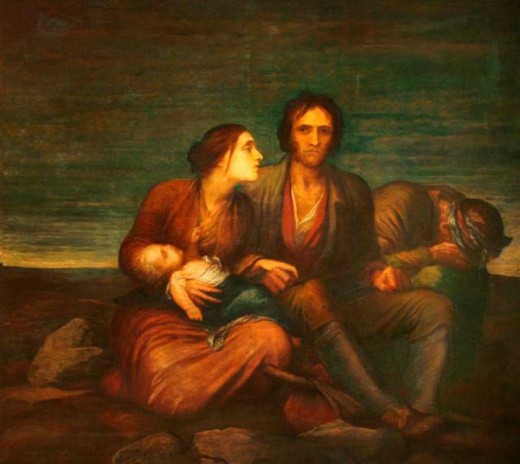
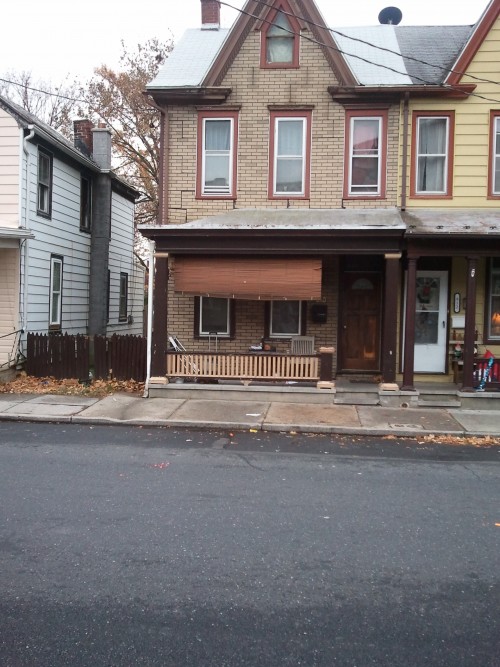
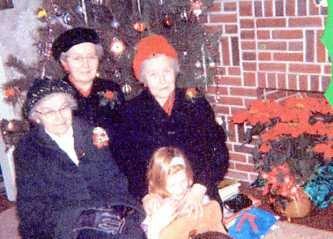
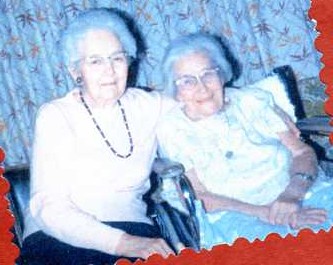
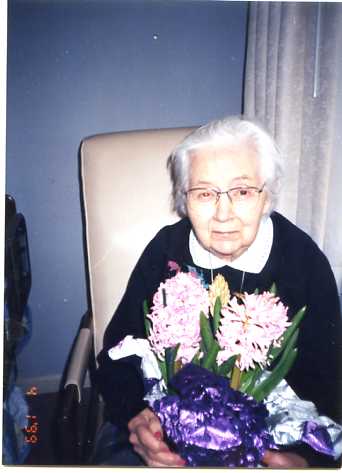
This brings back such wonderful memories! Nanny, Auntie Gladdie and Auntie Elsie have been three of the sweetest people I have ever known! Always smiling and happy and could not have been kinder to everyone they met!!!